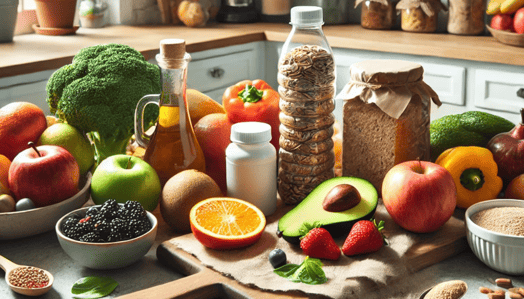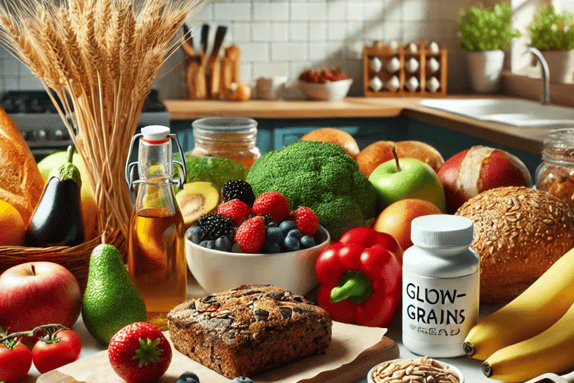Nutrition Myths Debunked
Separating Fact from Fiction
11/7/20245 min read


4. Myth: All Supplements Are Necessary for Optimal Health
The supplement industry is a multi-billion dollar market, with products promising to fill any gap in your diet. Some people believe that to be healthy, they must take a variety of vitamins, minerals, and herbal supplements daily.
The Reality: For most healthy individuals who eat a balanced diet, supplements aren’t necessary. Essential nutrients can often be obtained through a varied diet rich in fruits, vegetables, whole grains, proteins, and healthy fats. Overuse of supplements can even be harmful; for instance, excessive iron or vitamin D intake can cause toxicity.
Supplements can be beneficial in certain cases, such as for individuals with specific deficiencies, pregnant women, or those with dietary restrictions. However, it’s always best to consult with a healthcare provider before starting any supplement regimen to ensure it’s safe and necessary for your unique health needs.
5. Myth: Egg Yolks Are Bad for Your Heart
Egg yolks have been controversial in the health world for years, primarily because they contain cholesterol. For a long time, people believed that eating egg yolks could raise cholesterol levels and contribute to heart disease.
The Reality: Research has shown that for most people, dietary cholesterol has minimal impact on blood cholesterol levels. The body regulates cholesterol production based on intake, meaning that if you consume cholesterol in food, your body compensates by producing less of it.
Egg yolks are rich in nutrients like vitamins A, D, and E, as well as choline, which supports brain health. Rather than avoiding egg yolks, try to limit saturated and trans fats, which have a greater impact on heart health. If you’re concerned about cholesterol, talk with your healthcare provider for personalized advice.
When it comes to nutrition, there’s no shortage of advice out there. But not all of it is based on sound science. Between detox diets, low-carb fads, and endless debates over supplements, it’s easy to be misled. To help you make informed choices, we’re debunking some of the most common myths about nutrition, providing clarity on topics that often cause confusion.
1. Myth: Detox Diets Cleanse Your Body
Detox diets promise to flush out toxins, improve health, and give your digestive system a break. Many detoxes involve restrictive eating plans, juice-only diets, or consuming specific supplements. While the idea is tempting, the truth is our bodies are incredibly efficient at detoxifying naturally.
The Reality: Your liver, kidneys, lungs, and digestive system work around the clock to remove toxins from the body. There's no scientific evidence supporting the effectiveness of detox diets in improving these natural processes. In fact, extreme detox diets can deprive your body of essential nutrients, leading to fatigue, muscle loss, and even nutrient deficiencies.
Instead of following a restrictive detox, focus on eating a balanced diet rich in whole foods, drinking plenty of water, and incorporating fiber-rich foods to support your body’s natural detoxification systems.
2. Myth: Carbohydrates Are Fattening and Should Be Avoided
Carbohydrates have become one of the most misunderstood food groups in recent years, largely due to the popularity of low-carb and ketogenic diets. Many believe that carbs lead to weight gain and should be avoided at all costs.
The Reality: Not all carbs are created equal. Whole, unprocessed carbohydrates found in fruits, vegetables, whole grains, and legumes are vital for health, providing energy, fiber, and essential nutrients. The types of carbs that can contribute to weight gain and other health issues are refined or processed ones—like sugary snacks, white bread, and sodas—which can lead to blood sugar spikes and offer little nutritional value.
Carbs are the body’s preferred energy source, especially for the brain and muscles. Eliminating them entirely can lead to fatigue, poor mood, and decreased performance in physical activities. Instead, focus on complex, whole-food carbs that support sustained energy and overall health.
3. Myth: Eating Late at Night Causes Weight Gain
Many people believe that eating after a certain hour leads to weight gain because the body processes food differently at night. This belief has led to countless rules about avoiding food after 6 or 8 p.m.
The Reality: Weight gain isn’t dictated by the time you eat; it’s about your total calorie intake and expenditure over time. While eating large meals late at night might disrupt digestion or sleep for some people, there’s no direct link between eating late and weight gain. What matters more is the quality and quantity of what you eat.
If you’re hungry late at night, reach for nutrient-dense, light snacks—like yogurt, fruit, or a handful of nuts—that satisfy without being overly filling.


6. Myth: Protein Shakes Are Necessary for Building Muscle
Protein shakes are heavily marketed to athletes and gym-goers, with claims that they’re essential for muscle growth and recovery. Many people believe that without protein shakes, they won’t make gains or meet their fitness goals.
The Reality: While protein is crucial for muscle repair and growth, most people can meet their needs through a balanced diet that includes foods like chicken, fish, beans, dairy, and eggs. Protein shakes can be convenient, especially for those with busy lifestyles or higher protein needs, but they aren’t required for muscle growth.
For those trying to build muscle, aim to include protein in every meal and snack rather than relying solely on shakes. Your body benefits from a variety of protein sources, which provide not only amino acids but also other nutrients vital for health and performance.
7. Myth: Low-Fat and “Diet” Foods Are Healthier Choices
Many diet products claim to be healthier alternatives to regular foods, especially those labeled "low-fat" or "light." These products are often marketed as better options for weight loss and heart health.
The Reality: When fat is removed from food, sugar and additives are often added to compensate for flavor, making some low-fat and diet foods less healthy than their full-fat counterparts. Fats are essential for brain health, hormone production, and nutrient absorption, and not all fats are harmful. In fact, healthy fats from sources like avocados, nuts, and olive oil can support weight management and heart health.
Opting for whole, unprocessed foods instead of “diet” versions allows you to enjoy the natural flavors and nutrients, contributing to a more satisfying and balanced diet.
Final Thoughts: Navigating Nutrition Wisely
With so much nutrition information available, it’s essential to understand what’s backed by science and what’s merely a myth. Remember, sustainable health comes from balanced eating, staying informed, and making choices that support your unique lifestyle and needs.
Stay Informed with Reliable Nutrition Tips
Want to stay on top of the latest, evidence-based nutrition insights? Sign up for our newsletter to get expert guidance, health tips, and debunked myths delivered right to your inbox. Join a community dedicated to healthy, informed eating—subscribe now!
Sign up below and get your FREE Ebook " The HIIT Revolution”
